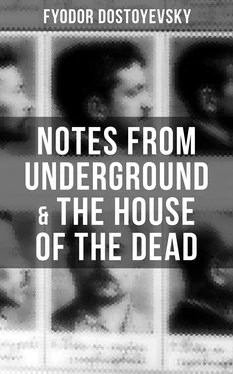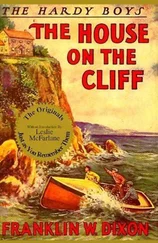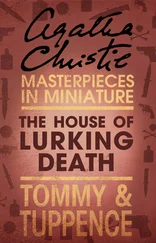At last we reached the river bank; a little lower down lay the old hulk which we were to break up, stuck fast in the ice. On the other side of the water was the blue steppe and the sad horizon. I expected to see the whole party set to work. Nothing of the kind happened: some immediately sat down casually on logs of wood that lay near the bank, and nearly all took from their pockets pouches of native tobacco-which was sold in leaf at the market at the rate of three kopecks a pound-and short wooden pipes. They lighted them while the soldiers encircled us and looked on with obvious boredom.
‘Who the devil had the idea of sinking this barge? ‘ asked one of the convicts in a loud voice, without addressing anyone in particular.
‘Were they very anxious, then, to have it broken up?’
‘The people were not afraid to give us work,’ said another.
‘Where are all those peasants going to work?’ said the first, after a short silence. He had not even heard his companion’s answer, and was pointing to the distance, where a troop of peasants were marching in file across the virgin snow.
All the convicts turned slowly in that direction, and began from mere idleness to laugh at the peasants as they approached.
One of them, the last of the line, was the source of particular amusement: he walked with his arms apart, his head on one side, and wore a tall pointed cap. His shadow was cast in clear outline on the white snow.
‘ Look at Petrovitch,’ said one of my companions, imitating the local accent. Oddly enough, the convicts looked down on the peasants, although they were for the most part peasants themselves.
‘Look at that fellow on the end, he looks as if he were planting radishes.’
‘He’s an important chap, he has lots of money,’ said a third.
They all began to laugh without, however, seeming genuinely amused.
Meanwhile a scone-seller had approached. She was a brisk, lively person, and it was with her that the five kopecks given by the townsman were spent.
The young fellow who sold white bread in the prison took two dozen of her scones, and then tried beating down the price. She would not, however, agree to his terms.
At this point the sergeant in charge arrived, cane in hand.
‘What are you sitting down for? Get on with your work.’
‘Detail us off, Ivan Matveitch,’ said one of our so-called foremen, as he slowly got up.
‘You know your jobs. Dismantle that barge and quick about it.’
At last the convicts rose and made their way slowly down to the river. Instructions now fell thick and fast. The barge, it seemed, was not to be actually broken up: the skeleton of the hull was to be left intact, and this was not an easy thing to manage.
‘Pull this beam out, that’s the first thing to do,’ cried one convict, a mere navvy who knew nothing whatever about it. This man, very quiet and a little stupid, had not previously spoken. He now bent down, took hold of a heavy beam with both hands, and waited for someone to help him. No one, however, seemed inclined to do so.
‘You! You’ll never manage it; not even your grandad the bear could do it,’ muttered someone between his teeth.
‘Well, chum, are we going to make a start? I can’t carry on alone,’ said the other morosely, and he stood upright.
‘Well, what’s the hurry unless you’re going to do the whole job on your own?’
‘ I was only making a remark,’ said the poor fellow, excusing himself for his forwardness.
‘Must you have blankets to keep yourselves warm, or do you want to be otherwise heated this winter?’ bellowed a corporal at the twenty men who seemed to loathe to begin work. ‘Get on with it at once.’
‘It’s never any use being in a hurry, Ivan Matveitch.’
‘Look here, Savelieff, you’re doing nothing at all. What are you looking about for? Are your eyes for sale, by any chance? Come along now.’
‘But I can’t do the work single-handed.’
‘Tell each of us what to do, Ivan Matveitch.’
‘I told you before that I have no special tasks to give you. Get to work on the barge, and when you’ve finished we’ll go back home. Get on with your work, I tell you.’
The prisoners began work, but without much vigour or goodwill, and the sergeant in charge was understandably furious. While the first rivet was being drawn it suddenly snapped.
‘It broke in pieces,’ said a convict in self-justification. Impossible, they all clamoured, to carry on like this. What was to be done? A long discussion took place between the prisoners, and little by little they began to quarrel; nor did this seem likely to be the end of it. The sergeant was yelling and brandishing his cane, but the second rivet snapped like the first. It was then agreed that hatchets were of no use, and that other tools must be procured. Accordingly, two prisoners were sent under escort to the fortress to get the proper instruments. Awaiting their return, the others quite calmly sat down on the bank, pulled out their pipes, and began once more to smoke. Finally, the sergeant spat with contempt.
‘Well,’ he exclaimed, ‘you people won’t die from overwork. My God, what a crowd! ‘ he grumbled, ill-humouredly. He shrugged his shoulders and went off towards the fortress, waving his stick.
An hour later the clerk of works arrived. He listened quietly to what the convicts had to say, told them that the job he wanted them to do was only to detach four rivets without breaking them, and partially dismantle the barge. As soon as this was done, they could go home. The task was not easy, but, lord! how the convicts now set to work! Where now was their idleness, their want of skill? Hatchets began to dance, and the rivets were quickly sprung. Those who had no hatchets made use of thick sticks to push beneath the rivets, and thus in due time and in artistic fashion they levered them out. The convicts seemed suddenly to have become intelligent in their conversation, and no more insults were heard. Everyone knew perfectly what to say, to do, and what to advise. Exactly half an hour before the beating of the drum, the appointed task was finished, and we returned to the prison fatigued, but pleased to have knocked off thirty minutes from the regular working hours.
As regards myself, I have only one remark to make: I seemed all the time to be in somebody’s way, I was told to ‘ get out of the light,’ and generally abused. Any one of the ragged lot, the most miserable, numbskull, ham-handed navvy, who would not have dared to utter a syllable to the other convicts, took upon himself to swear at me if I approached him, under pretext that I interfered with him in his work. At last one of the better types said to me frankly but coarsely:
‘What are you doing here? Clear off! No one asked for your help.’
‘Hear, hear!’ added another.
‘You’d do better to take a pitcher,’ said a third, ‘and carry water to the building site, or go to the tobacco factory. You’re no use here.’
I was obliged to keep apart. To remain idle while others were working seemed a shame; but when I moved to the opposite end of the barge I was insulted anew.
‘A fine crew we’ve got!’ they cried. ‘What can you do with fellows like him?’
Nor was this goodnatured fun: they were delighted with the opportunity of scoffing at a gentleman.
The reader will now understand why in those early days I was at a loss to know how I should ever manage to get on with such people. I foresaw that such incidents would often recur; but I resolved not to alter my line of conduct in any way, whatever the result might be. I had decided to live simply and intelligently, without manifesting the least desire to be on familiar terms with my fellow prisoners, but also without repelling them if they sought my company; to appear indifferent to their hatred and their threats; and to pretend as far as possible not to notice them. Such was my plan for I realized from the outset that they would despise me if I adopted any other course.
Читать дальше












